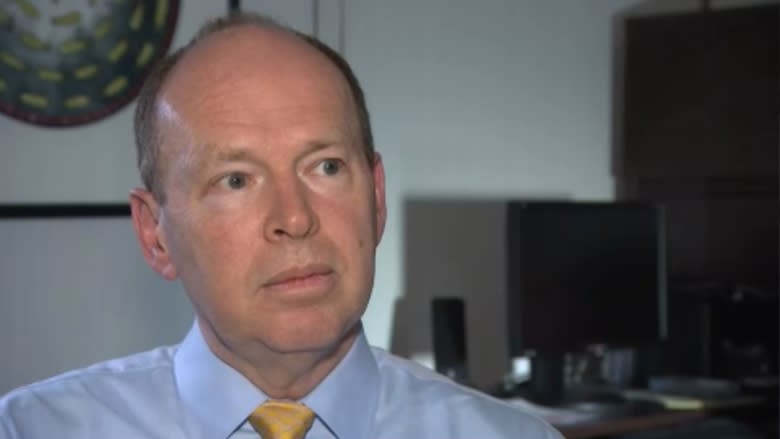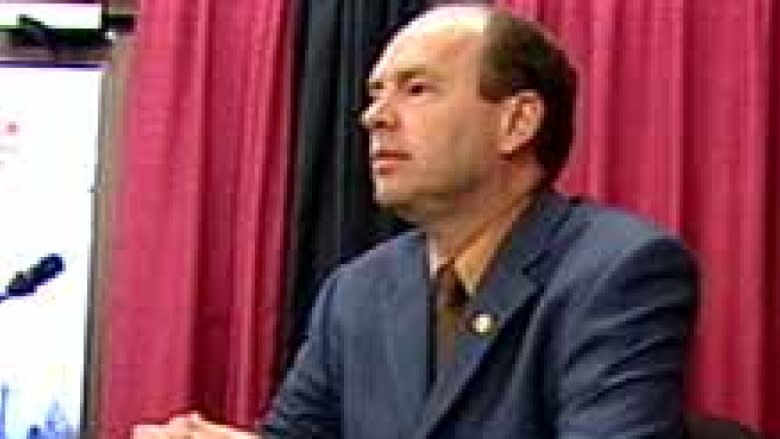Meet the bureaucrat poised to shake up N.L.'s health system
Too many nurses, taking too much sick leave.
Doctors concentrated too much in St. John's, and not working as efficiently as they should.
A health model that's built to operate Monday to Friday, with professionals spending too much time inside institutional walls.
For John Abbott, one of Newfoundland and Labrador's most senior public servants, these are just some of the problems that have been targeted for reform.
And he is not shy about talking about them, nor about a price tag he sees as far too high.
"The cost of our system is at a place now where we really can't afford it," said Abbott, the plain-spoken deputy minister of health, and a career public servant who found himself on the wrong side of the fence when Danny Williams was premier.
Newfoundland and Labrador's $3-billion health system is heading for a major shakeup, and Abbott is charged with seeing the project through.
In a frank interview with CBC News about the department's strategic plan, he said there are no plans to close hospitals or clinics.
But he is blunt about what will happen.
"We have put in a lot of services and facilities that we no longer need and no longer can afford. Now we have to figure out in a collective way how we can rewrite the balance."
A change in career path
Abbott has occupied the deputy minister's office in the Department of Health and Community Services for 15 months, following more than five years working with the Health Council of Canada, where he focused on health policy at the national level.
The fact he's available for interviews — and speaks in such candid terms — is evidence of just how much power he wields.
These are familiar surroundings — and issues — for Abbott. He served as deputy minister before, when the Progressive Conservatives were in power and Danny Williams was in the premier's chair.
His previous stint did not end happily. Abbott was arguably thrown under the political bus amid a scandal involving testing for breast cancer patients.
He was pushed out of the health department because he had failed to include his own minister in a briefing note that went to the premier's office.
Premier Dwight Ball lured Abbott back to the health department last year. Much, though, has changed, and Newfoundland and Labrador's finances are far more dire.
Change is afoot
It's clear Abbott has been given a mandate to make change.
"We are looking at each service. Each facility. Each program and each professional group to determine how we can deliver that service at a lower cost and to improve outcomes," he said.
He describes a system in the coming years that will likely include fewer nurses and doctors, where health care is brought directly to the community, and services are provided only when services are needed.
That's no easy task for a large and unwieldy system that cost about $3 billion last year for a population of just over half-a-million. The province spends, on a per-capita basis, 25 per cent more for health care than the national average.
Whether you're a doctor, a nurse, a paramedic or even the operator of a private personal-care home or ambulance service, Abbott said prepare for a methodical and systematic retooling of the system over the next three to five years.
Change is coming in three areas: primary care, mental health and addictions, and caring for seniors. It's an approach Abbott called "triple aim."
He talks about reducing the health workforce through attrition, reassigning health providers to where they're most needed, changing the way the four regional health authorities operate, and improving services to rural areas by increasing the number of nurse practitioners.
More support at home
The most notable change? More services delivered in the community through new primary health-care teams comprising a broad spectrum of health professionals.
He pointed to palliative care as an example, explaining that supports will be made available so people can spend their final days at home, rather than in an expensive institutional bed.
"We'll have more nursing support, physician support in your home," he said.
"We want to accelerate what we're doing here to become one of the leaders in the country."
Work is already underway to review how the province deploys its health services.
More nurses? No way, says Abbott
One of the biggest obstacles to change, Abbott admitted, will be acceptance from organizations that represent different service providers.
The landscape is already set for confrontation.
The registered nurses' union recently launched a public campaign to lobby for more RNs. The union won't get any support from Abbott.
He wants to find out whether some of the duties being performed now by RNs can be shifted to licensed practical nurses, and he's not happy with the amount of sick leave that nurses have been taking.
"We don't have as productive of a nursing workforce as we should," he said, explaining that while overtime costs are similar to other provinces, sick leave is significantly higher.
"At the same time we have 45 per cent more nurses than the rest of the country. I think to say we need more nurses in light of that [I] would suggest probably isn't the answer."
Abbott said the solution is to find out why the sick leave rate is so high, and determine whether various units are being staffed properly.
He believes improvements can be made through what he's calling a new "workforce management system."
Flu shot policy a signal of change for doctors
As for doctors, Abbott said talks are looming with the Newfoundland and Labrador Medical Association, and government has already served notice that the status quo is not acceptable.
In a controversial move, doctors are no longer paid to administer flu shots, and Abbott hinted that's just the beginning.
The creation of primary health teams, he added, could change the way patients receive care, with doctors, nurses and others working together. This would avoid the need for patients to see a doctor multiple times.
"We just need to reorient our workforce to where we need them," he said.
According to Abbott, it's possible to shave several hundred million dollars from the health budget, and he said new federal money will also help the department achieve its goals.
To sit back and do nothing is not an option, he said, since it will force government to make "draconian, arbitrary" measures to right-size the system.
"We want to be able to demonstrate more effective use of the public dollar so we get the dollars we absolutely need. No more. No less."




